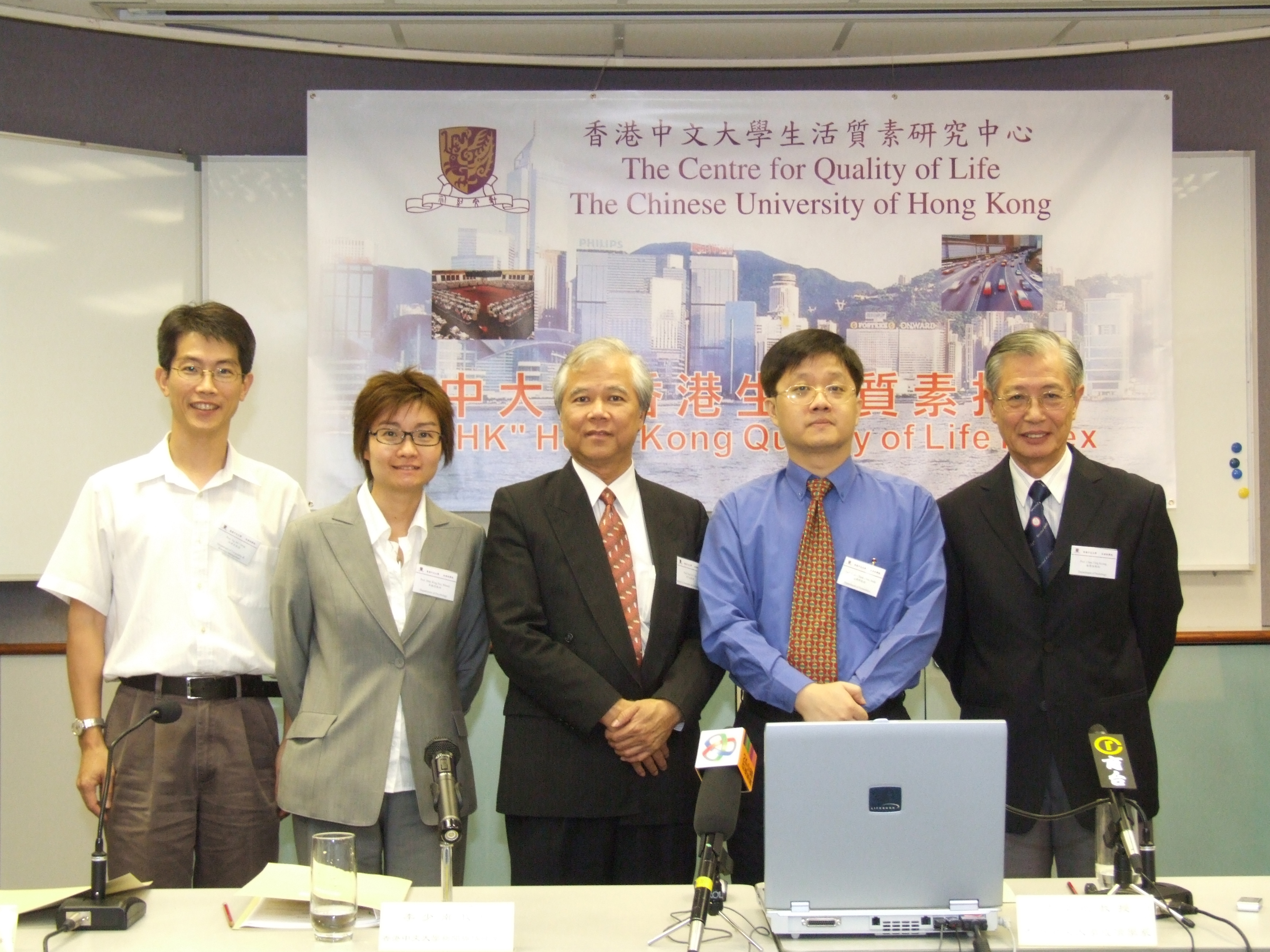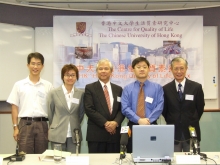CUHK
News Centre
‘CUHK’ Hong Kong Quality of Life Index Reveals the Continuous Improvement of the Quality of Life for Hong Kong
The ‘CUHK’ Hong Kong Quality of Life Index, which is compiled by the Centre for Quality of Life of The Chinese University of Hong Kong, shows that the quality of life in Hong Kong has improved continuously in the last four years. Though the overall score of 2006 is slightly higher, there was a small decline in both the social and environmental sub-indices while the economic sub-index was a gradual increase.
According to the ‘CUHK’ Hong Kong Quality of Life Index released this year, the score of the Index of 2006 is 108.47. It is higher than the scores of 2005 (108.34), 2004 (105.78), 2003 (104.20) and 2002 (100), indicating that the quality of life in Hong Kong has improved consistently.
As compared with last year, 9 out of the 21 indicators improved in 2006 (Appendix 1). The standardized mortality rate was lower and the life expectancy at birth was higher. Hong Kong people were more satisfied with their lives, and their satisfaction with the performance of the HKSAR Government increased considerably. The age participation rate for first-degree programmes and post-graduate programmes in local universities was higher in 2006. In general, the local economy improved throughout 2006 and the unemployment rate dropped. With regard to the environment, the water quality, and the recycle rate of municipal solid waste were better than those in the previous year.
However, 11 indicators were worse in this year (Appendix 2). The stress index, the overall crime rate, and the notification rate of notifiable infectious diseases were higher in 2006. Public expenditure on both health and education as a proportion of GDP continue to drop. The press criticism index also dropped. This might be because Hong Kong citizens are in general, more satisfied with the government under the leadership of the Hon. Donald Tsang Yam-kuen, Chief Executive. While the local economy continues to grow, the findings have shown a slight decrease in index of current economic conditions and real wage, while the real rental index increased. With regard to the environment, there was a decline in the air and noise index.
In summary, as compared with 2005, there were 9 indicators that were better and 11 were worse in 2006, while the press freedom index remained unchanged.
In 2003, the Faculty of Social Science designed the ‘CUHK’ Hong Kong Quality of Life Index. It is the intention of the Faculty to use this composite index to measure and keep track of the Hong Kong quality of life in the 21st century, and to provide policy makers and the community with a useful reference tool. It also aims to advocate the quality of life in Hong Kong and draw public attention to this issue. Starting from the year of 2003, the Index is released annually. For this reason, the Centre for Quality of Life has been set up to conduct on-going quality of life research.
The ‘CUHK’ Hong Kong Quality of Life Index consists of 21 indicators that are grouped into three sub-indices (Appendix 3). The indicators are selected according to the coverage, measurability, representativeness, and importance to the quality of life in Hong Kong.
2002 was the base year of the study, the ‘CUHK’ Hong Kong Quality of Life Index for that year was 100. If the Index of a year is above 100, it means that the quality of life in Hong Kong in that year is better than that of 2002. If the index is below 100, it reveals that the quality of life in Hong Kong of that year is worse than that of 2002. If the Index is 100, it indicates that the Hong Kong quality of life of that year is the same as that of 2002.
For further enquires on the ‘CUHK’ Hong Kong Quality of Life Index, please contact Prof. Andy Kwan of the Department of Economics at 2609 8196 or visit the Centre for Quality of Life website: www2.cuhk.edu.hk/ssc/qol.
From left: Professor Ng Sai Leung, Associate Professor, Department of Geography and Resource Management, CUHK Professor Winnie Mak, Assistant Professor, Department of Psychology, CUHK Professor Paul Lee, Dean, Faculty of Social Science, Professor, School of Journalism and Communication, CUHK Professor Andy Kwan, Associate Director, Centre for Quality of Life, Associate Professor, Department of Economics, CUHK Professor Chan Ying Keung, Adjunct Professor, Department of Sociology, CUHK



